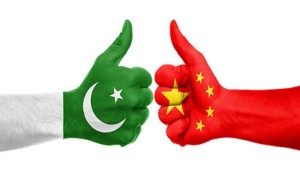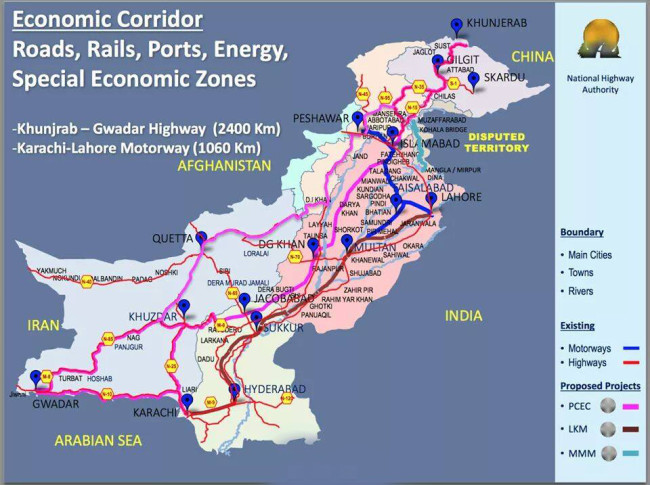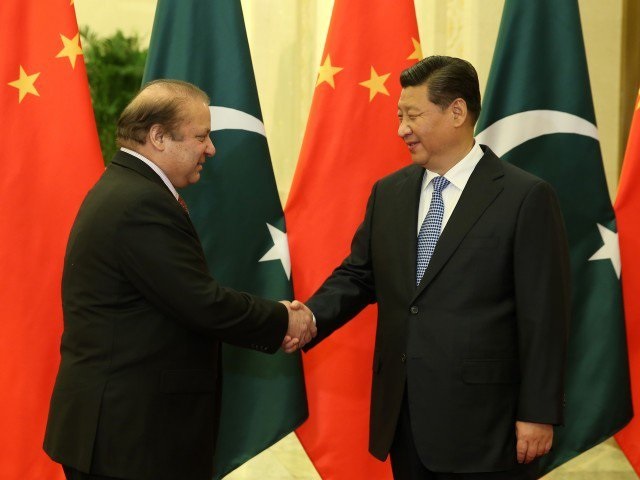The China–Pakistan Economic Corridor (CPEC) is an ongoing development mega project which aims to connect Gwadar Port in southwestern Pakistan to China’s northwestern autonomous region of Xinjiang, via a network of highways, railways and pipelines to transport oil and gas. The economic corridor is considered central to China–Pakistan relations and will run about 3,000 km from Gwadar to Kashgar. Overall construction costs are estimated at over $46 billion, with the entire project expected to be completed in several years. The Corridor is an extension of China’s proposed 21st century Silk Road initiative. According to a Firstpost report, “this is the biggest overseas investment by China announced yet and the corridor is expected to be operational within three years and will be a strategic gamechanger in the region, which would go a long way in making Pakistan a richer and stronger entity than ever before.” The project is considered significant in many ways and is the result of the deep rooted friendship between the two countries. The impact of this project has been astounding on Pakistan’s economy as Pakistan’s status changed overnight from a failing economy to a strong developing one, due to this project. It is seen by many as a project which will eventually benefit the entire region and not just the two countries involved.
The CPEC project offers Pakistan the complete deal. Apart from transport infrastructure it aims to establish telecommunications infrastructure as well along with a permanent solution to the ongoing energy crisis in Pakistan. The CPEC also looks to enhance intelligence sharing between the two countries. The main purpose of this megaproject, it seems, is to equip Pakistan with everything it requires to turn into an economic hub for the entire region. It is mainly due to this reason that it has been termed as a “Fate and Game Changer” by Pakistani media, a claim which has been endorsed by the government as well. According to the Guardian “”The Chinese are not just offering to build much-needed infrastructure but also make Pakistan a key partner in its grand economic and strategic ambitions.” This is something that China has claimed openly and it has not gone well with many global powers, as they view this partnership as China’s way of increasing its influence in the region while it will grant Pakistan strategic economic autonomy, paving its path to become a global power as it will reduce Pakistan’s reliance on foreign assistance. The project will also open trade routes for Western China and provide China direct access to the resource-rich Middle East region via the Arabian Sea, bypassing longer logistical routes currently through the Strait of Malacca.
Strategic Importance
The corridor is of great strategic importance as it seeks to increase the volume of trade routes between China, the Middle East and Africa. One of the biggest concerns for China is energy security as it remains the biggest importer of oil in the world. For this purpose, oil pipelines passing thorough Pakistan will not require travelling through Southeast Asia via the Ocean. According to the Asian Development Bank, “CPEC will connect economic agents along a defined geography. It will provide connection between economic nodes or hubs, centered on urban landscapes, in which large amount of economic resources and actors are concentrated. They link the supply and demand sides of markets.”In words of the Chinese Foreign Ministry Spokesperson HuaChunying, CPEC will “serve as a driver for connectivity between South Asia and East Asia.”
The chairman of the Pakistan-China Institute, MrMushahidHussain, believes that the corridor “will play a crucial role in regional integration of the ‘Greater South Asia’, which includes China, Iran, Afghanistan, and stretches all the way to Myanmar.
It is China’s intent to build oil storage facilities along with a refinery at Gwadar Port, with oil being transported to its Xinjiang Uighur Autonomous Region through pipeline and road. This will allow China to move goods and energy to inland China bypassing the Strait of Malacca, which carries the risk of being blocked by India or the United States in case of any hostilities. The project will lead to development in western China, a disturbed area affected by the activities of radical separatists. Foxsconsnreselil . steam cloud . Iran has also responded positively over the proposal to link the Iran–Pakistan gas pipeline with China, with the Iranian ambassador to China describing it as a “common interest” between the three countries.
Signing of 51 MOUs
The memoranda of understanding signed by both sides are listed below:
1. Joint Statement between the People’s Republic of China and the Islamic Republic of Pakistan on establishing the all-weather strategic cooperative partnership.
2. Minutes of the 4th JCC of China-Pakistan Economic Corridor.
3. Economic and Technical Cooperation Agreement between the Government of the People’s Republic of China and the Government of the Islamic Republic of Pakistan.
4. Exchange of Notes of feasibility study of the Demonstration Project of the DTMB between the Government of the People’s Republic of China and the Government of the Islamic Republic of Pakistan.
5. Exchange of notes on provision of Anti-Narcotics Equipment between the Government of the People’s Republic of China and the Government of the Islamic Republic of Pakistan.
6. Exchange of notes on provision of Law Enforcement Equipment between the Government of the People’s Republic of China and the Government of the Islamic Republic of Pakistan.
7. Exchange of Notes on Feasibility Study of Gwadar Hospital between the Government of the People’s Republic of China and the Government of the Islamic Republic of Pakistan.
8. MOU on provision of Chinese Governmental concessional Loan for second phase up-gradation of Karakorum Highway (Havelian to Thakot) between Ministry of Commerce of the People’s Republic of China and Ministry of Finance and Economic Affairs of the Islamic Republic of Pakistan.
9. MOU on provision of Chinese Governmental concessional Loan for Karachi-Lahore Motorway (Multan to Sukkur) between Ministry of Commerce of the People’s Republic of China and Ministry of Finance and Economic Affairs of the Islamic Republic of Pakistan.
10. MOU on provision of Chinese Governmental concessional Loan for Gwadar port East Bay Expressway Project between Ministry of Commerce of the People’s Republic of China and Ministry of Finance and Economic Affairs of the Islamic Republic of Pakistan.
11. MOU on provision of Chinese Governmental concessional Loan for Gwadar International Airport between Ministry of Commerce of the People’s Republic of China and Ministry of Finance and Economic Affairs of the Islamic Republic of Pakistan.
12. Protocol on Banking Services to Agreement on Trade in Services between the Government of the Islamic Republic of Pakistan and the Government of the People’s Republic of China.
13. MOU on provision of Material for Tackling Climate Change between National Development and Reform Commission of the People’s Republic of China and Ministry of Finance (EAD) of the Islamic Republic of Pakistan.
14. Framework Agreement on Cooperation on Major Communications Infrastructure Project between the Government of the People’s Republic of China and the Government of the Islamic Republic of Pakistan.
15. MOU on Cooperation between NDRC of the People’s Republic of China and ministry of Planning Development and Reform of the Islamic Republic of Pakistan.
16. MOU on Pro Bono Projects in the Port of Gwadar Region between Ministry for Planning, Development and Reform of the Islamic Republic of Pakistan and the International Department of the Central Committee of the Communist Party of China.
17. MOU on establishment of China-Pakistan Joint Cotton Bio-Tech Laboratory between the Ministry of Science and Technology of the People’s Republic of China and the Ministry of Science and Technology of the Islamic Republic of Pakistan.
18. Framework Agreement between the National Railway Administration, Government of the People’s Republic of China and the Ministry of Railways, Government of the Islamic Republic of Pakistan on Joint Feasibility Study for up-gradation of ML1 and Establishment of Havelain Dry port of Pakistan Railways.
19. Protocol on the Establishment of China-Pakistan Joint Marine Research Center between State Oceanic Administration of the People’s Republic of China and the Ministry of Science and Technology of the Islamic Republic of Pakistan.
20. MOU on cooperation between the State Administration of Press, Publication, Radio, Films and Television of China and Ministry of Information, Broadcasting and National Heritage of Pakistan.
21. Triple Party Agreement between China Central Television and PTV and Pakistan Television Foundation on the re-broadcasting of CCTV-NEWS/CCTV -9 Documentary in Pakistan.
22. Protocol on establishment of Sister Cities Relationship between Chengdu city Sichuan Province of PRC and Lahore City.
23. Protocol on establishment of Sister Cities Relationshipbetween Zhuhai City, Guangdong province of the People’s Republic of China and Gwadar city, Balochistan of the Islamic Republic of Pakistan.
24. Protocol on establishment of Sister Cities Relationship between Karamay City, XianjianUgur, and autonomous region of the People’s Republic of China and Gwadar city, Balochistan of the Islamic Republic of Pakistan.
25. Framework Agreement between NEA and MoPNRonGwadar-Nawabshah LNG Terminal and Pipeline Project.
26. Commercial Contract on Lahore Orange Line Metro Train Project.
27. Agreement on financing for Lahore Orange line Metro Train project.
28. MOU on financing for KKH up-gradation Phase-2 (Havelian to Takot), KLM, Gwadar East Bay Expressway, Gwadar International Airport Projects.
29. Financing Agreement relating to the 870 MW Hydro-Electric SukiKinari Hydropower Project between EXIM Bank of China, Industrial and Commercial Bank of China Limited and SK Hydro (Private) Limited.
30. Financing Cooperation Agreement between the EXIM Bank of China and Port Qasim Electric Power Company (Private) Limited (on Port Qasim 2x660MW Coal-fired Power Plant).
31. Framework Facility Agreement for 720MW Karot Hydropower Project between China Development Bank Corporation, EXIM Bank of China and Karot Power Company (Private) Limited.
32. Term Sheet of the facility for Zonergy 9×100 MW solar project in Punjab between China Development Bank Corporation, EXIM Bank of China and Zonergy Company limited.
33. Drawdown Agreement on Jhimpir wind Power project between UEP Wind power (Private) Limited as Borrower and China Development Bank Corporation as lender.
34. Terms and Conditions in favor of Sindh Engro Coal Mining Company for Thar Block II 3.8Mt/a mining Project, Sindh province, Pakistan Arranged by China Development Bank Corporation.
35. Terms and Conditions in favor of EngroPowergenThar (Private) Limited, Sindh province, Pakistan for Thar Block II 2x330MW Coal Fired Power Project Arranged by China Development Bank Corporation.
36. Framework Agreement of Financing Cooperation in Implementing the China-Pakistan Economic Corridor between China Development Corporation and HBL.
37. MOU with respect to Cooperation between WAPDA and CTG.
38. MOU among PPIB, CTG, and Silk Road Fund on Development of Private Hydro Power Projects.
39. Facility operating Agreement for Dawood Wind Power project between ICBC and PCC of China and HDPPL.
40. Framework Agreement for Promoting Chinese Investments and industrial Parks Developments
in Pakistan between ICBC and HBL on financial services corporation.
41. The financing term sheet agreement for Thar Block -I between ICBC, SSRL.
42. Energy Strategic Cooperation Framework Agreement between Punjab Province of Pakistan and China Huaneng Group.
43. Framework Agreement on the China Pakistan Economic Corridor Energy Project Cooperation between Ministry of Water & Power and China Export & Credit Insurance Corporation (SINOSURE).
44. Cooperation Agreement between Sino-Sindh Resources (Pvt.) Ltd and Shanghai Electric Group for Thar Coalfield Block I Coal-Power integrated Project in Pakistan.
45. Cooperation Agreement for Matiyari-Lahore and Matyari (Port Qasim)-Faisalabad Transmission and Transformation Project between National Transmission Distribution Company (NTDC) and National Grid of China.
46. IA on Port Qasim Coal fired Power Plant between Power China and GoP.
47. Facility Agreement for the Sahiwal Coal-fired Power Plant Project between industrial and Commercial Bank of China Limited, Huaneng Shandong Electricity limited and Shandong Ruyi Group.
48. Cooperation Agreement on Hubco Coal-fired Power Plant Project between CPIH and Hubco Power Company.
49. Facilitation Agreement on Salt Range Coal-fired Power Project between CMEC and Punjab Government.
50. MOU between NUML Pakistan and Xinjiang Normal University, Urumqi China for Cooperation on Higher Education.
51. Agreement on collaboration on establishment of NUML International Center of education (NICE) between NUML Pakistan and Xinjiang Normal University, Urumqi, China.
Source: The Nation
When the two leaders met in April they inaugurated the following projects by unveiling the plaques: 
1. Industrial and Commercial Bank of China, Lahore Branch.
2. Energization of 100 MW solar power plants at Quad-i-Azam solar park, Bahawalpur.
3. FM 98 Dosti Channel studio PBC-CRI, Islamabad.
4. Demonstration project of DTMB Broadcasting in Pakistan.
5. China Cultural center Pakistan.
6. China-Pakistan Joint Research Center for small hydropower, Islamabad.
7. China-Pakistan cross-border optical fiber cable system project.
8. Metro rail transit system on the Orange Line in Lahore.
Source: The Nation
Prime Minister Muhammad Nawaz Sharif and President Xi Jinpingalso conducted the Ground breaking of following power projects:
1. Karot 720 MW Hydropower project.
2. Dawood 50 MW Wind-power project.
3. Sachal 50 MW Wind-power project.
4. Zonergy 900 MW solar project.
5. Jhimpir 100 MW Wind-power project.
Source: The Nation
According to many experts, the completion of Gwadar would transform it into the economic hub of Balochistan and build a strategic nexus between Pakistan, China and Central Asia, generating billions in revenue and providing shorter land routes. It would provide links from the Caspian Sea to the Strait of Hormuz, and will enable Gwadar to compete with Persian Gulf ports. The United States, wary of Chinese strategic access to the Arabian Sea and its presence in the region, has reportedly tried several times to persuade Pakistan against involving China in the development, however, Pakistan did not pay any heed to such advice, something which does not sit well with the US.



